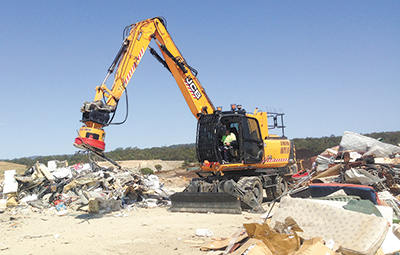Councils in New South Wales (NSW) are working to find more sustainable ways to manage their waste.
The past decade has seen Lake Macquarie City Council embark on the development of a new Waste Strategy to achieve the City’s waste avoidance and resource recovery targets.
Council’s Manager Sustainability Alice Howe, said, “We’ve taken a 360-degree approach, which includes ongoing diversion of recyclables and garden waste from landfill; development of a new processing facility for food and garden waste; expanding our landfill capacity and an ongoing education program encouraging our residents to avoid, reduce, reuse and recycle.”
The average Lake Macquarie garbage bin is currently one-third food waste, so separating food waste for disposal via the green bin is being introduced.
“Diverting food waste from landfill will keep our waste services as affordable as possible for our residents, extend the lifespan of our only landfill at Awaba, and the food and garden waste collected from the green bins will be processed into high quality mulch and compost for use on parks, gardens and sporting grounds.”
To date 15 other Councils in NSW have successfully implemented the three-bin system because of the financial, practical and environmental benefits it delivers.
Research suggests that people will happily use schemes to keep food waste out of landfill, as long as they are simple, efficient, and mess-free.
“Based on our experience with introduction of our garden waste service in 2013, we expect a high level of acceptance and participation from the Lake Macquarie community.”
City of Wagga Wagga is transitioning to a new three bin collection service this month. Along with their green, yellow and red bins households will receive a kitchen caddy and compostable liners to separate their food waste before placing it in the green – food organics, garden organics (FOGO) bin.
Cessnock City, Maitland City and Singleton councils joined forces one year ago to launch their kerbside garden organics collection service.
The joint initiative of the three councils has so far diverted 13,500 tonnes from landfill.
Contamination is low at 0.3 per cent, well below the state average of 2.1 per cent.
Cessnock City Mayor, Bob Pynsent said he was proud of the partnership between the councils.
“The garden organics service has far reaching benefits including reducing greenhouse gases, recovering vegetation for processing into quality compost and extending the life span of our local landfill sites.”
Maitland City Council’s Mayor, Loretta Baker said, “The partnership between our three councils in delivering this service has been amazing and shows what can be achieved by working together for our communities.”
Mayor of Singleton, Sue Moore said the organics collection was introduced based on requests from the community to re-use their green waste.
Using another approach to reduce the amount of waste directed to landfill, Central Coast Council thas purchased a specialised materials handling excavator.
The excavator sorts through household kerbside collection waste, recovering scrap metal, mattresses and other recyclable products that would otherwise be directed to landfill.
Council Waste Services Unit Manager, Andrew Pearce, said, “In the first five months of operation, the excavator has successfully recovered more than 1,000 tonnes of scrap metal and 1,400 mattresses.
“The mattresses are shredded to both recover the metal and to achieve improved compaction in the landfill until such time as we can find a market for this material.
“From this we are able to gain additional economic benefits from the sale of scrap metal, saving of valuable landfill space, as well as refund of the Environment Protection Authority’s (EPA) waste levy.”
Council purchased the excavator with a $200,000 grant awarded through the EPA’s Resource Recovery Facility Expansion and Enhancement Grants Program.
“We have since conducted further trials on construction, demolition, commercial and industrial waste at our Buttonderry Waste Management Facility.
“These trials have recovered approximately 50 tonnes of cardboard, soft plastic, untreated timber and hard plastic.
“We are currently analysing the results from the latest trial to inform future business decisions and identify new markets for recoverable products.”

















